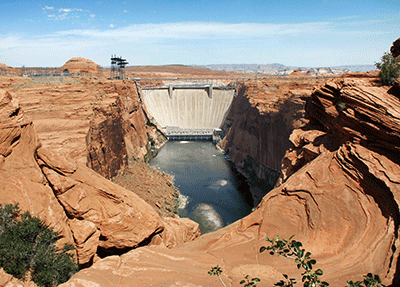Report Calls for “Radical Changes” to Colorado River Management
A recent report from experts at the Colorado River said it is time for radically new management strategies to secure the southwest’s water supply. It is intended to stimulate discussions on how certain parts of the River’s Law that expire in 2026 can be renegotiated. Melissa Sevigny from KNAU spoke to Jack Schmidt, director of the Center for Colorado River Studies at Utah State University, about the report.
Talk to me about the drought and climate change situation in the Colorado River Basin today.
In 2000, Lake Powell was essentially full or almost full. Around the year 2000 we found ourselves in a protracted phase of reduced runoff that continues to this day. If you keep your water usage high and less water is coming in, guess what, the reservoirs are starting – they are drawing water from the reservoirs. That’s why we have reservoirs. So everything worked as it should, except that the drought continued. At some point it was like this, whoa, we have problems here … And so we keep shortening agreements: How can you share the pain of the drought? We have an agreement – the law of the river is what it is – but you can’t replenish water. So when there is not enough water you have to deal with it … This new white paper that we have produced is essentially an exploration of: What if it stays that dry? What if it gets drier?
One of the results of your report is that the incremental changes to the flow law that you described are no longer enough. Can you talk about it
There were two types of incremental changes: we cut the usage significantly and then tried to work our way out of the problem – how we manage storage in Powell and Mead, how we move the shortage from Flaming Gorge…. What we are showing is that if the drought we are in today continues for twenty or thirty years, these small changes will not be enough … The only way to solve the problem is to treat it more systematically. Well … part of that solution is actually simple. This simple solution is for Upper Basin states to consider giving up their imagination of how much water they might use in the future and grappling with the reality of how much water they are using now. And at the same time, as the lower basin begins to diminish its use, the good news is that we can actually live sustainably within those limits.
You talked about how difficult it is to make radical changes, how are we going to get there, what do we need to get there?
We need a full social discussion about how to best use the Colorado River’s water supply to benefit the nation. I think we need to move away from concepts like “our water” and “your water”. We have a nation where we are all together. And we certainly have many communities, both some cities and indigenous people. A long tradition of the most prudent and sustainable use of water. That is the inevitable mentality that we must pursue over the long term.
Thank you very much, I appreciate that.
Thank you, see you.



Comments are closed.